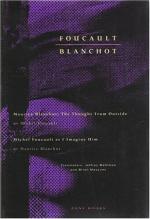|
This section contains 417 words (approx. 2 pages at 300 words per page) |

|
SOURCE: A review of The Infinite Conversation, in Review of Contemporary Fiction, Vol. 13, No. 3, Fall, 1993, pp. 241-2.
In the following review, Evenson describes the contents of The Infinite Conversation.
Written during the struggle between Hegelianism and anti-Hegelianism in French thought preceding poststructuralism, Blanchot’s Infinite Conversation provides a crucial link for understanding the more immediate roots of poststructuralism. Though Blanchot did much of his major writing in the forties, fifties, and sixties, his work has received little attention in America until recently. He is especially important for those interested in contemporary French theory. Blanchot’s writings inform the thought of Deleuze, Foucault, Lacan, and Derrida, and can provide contexts for some of the more difficult concepts of these other writers. Behind Foucault’s heterotopia and Deleuze’s disjunctive synthesis lurk Blanchot’s formulations on impossibility, interval, and the outside. Theoretically justifying Lacan’s purposeful inexpressiveness is Blanchot on...
|
This section contains 417 words (approx. 2 pages at 300 words per page) |

|


